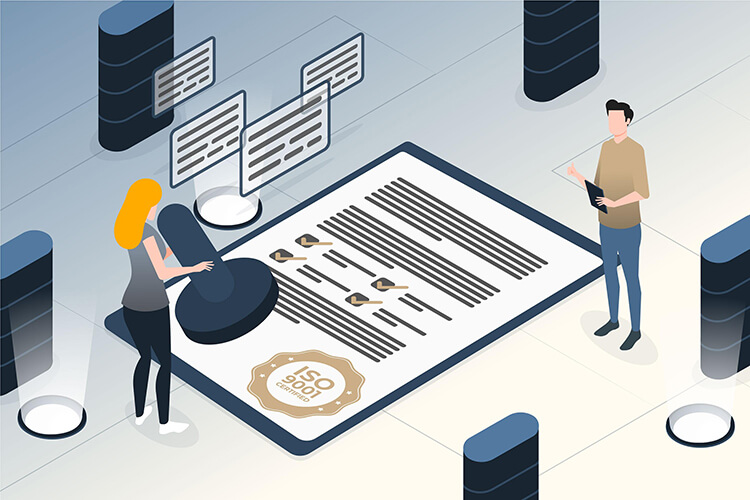Understanding Contract Compliance: A Detailed Look into its Importance and Implementation
Consider this. You’re a procurement professional or a contract manager, and you’ve just sealed the deal on a big contract. You’re feeling on top of the world, and why wouldn’t you? It’s a job well done, right? Well, not so fast! This is where the real challenge begins.
It’s all well and good to have a shiny new contract in your hands, but the truth of the matter is that it’s not worth the paper it’s written on if you’re not going to comply with it. Sounds harsh? Maybe. But in the complex, fast-paced, and high-stakes world of contracts, compliance isn’t just a box to be ticked—it’s the lifeblood of effective contract management.
Now, I know what you might be thinking: “Contract compliance? Isn’t that just a load of legal jargon?” Sure, it can seem that way. But here’s the deal: understanding contract compliance is a skill that can make or break your professional life. As daunting as it may seem, the benefits are enormous once you’ve got a grip on it. Not only can it save your organization from the risky pitfalls of non-compliance, but it can also enhance your reputation as a trusted partner, ensuring that your future contracts are both profitable and successful.
In this article, we will take a deep dive into the world of contract compliance. We’ll explore its importance, how to implement it effectively, and why it’s absolutely essential for you, whether you’re a seasoned contract manager, a procurement professional, or just interested in the field.
Defining Contract Compliance
Contract compliance. Those two words might sound complex, but at their core, they represent a simple yet powerful concept. So, what exactly is contract compliance? Well, in the simplest terms, contract compliance is about ensuring that all parties involved in a contract do what they’ve promised to do. It’s the process of making sure everyone sticks to the agreed-upon terms and conditions and fulfills their obligations as laid out in the contract.
You might be thinking, “Okay, that sounds pretty straightforward. But why is it so important?” Imagine this: You’ve spent weeks, maybe even months, negotiating a contract. You’ve poured over every detail, every clause, every stipulation. And then, once the contract is signed and sealed, one party decides not to comply. Maybe they don’t deliver on time, or they don’t meet the quality standards they promised. Suddenly, all that hard work is at risk. That’s where the importance of contract compliance comes in. It’s the safety net that ensures your contract holds water and that it does what it’s supposed to do.
But it’s more than just a safety net. In the business world, contract compliance is a key player in contract management and procurement success. It’s not enough to just sign a contract and hope for the best. Effective contract management means actively ensuring compliance at every stage. It means regularly checking in, keeping communication lines open, and addressing any potential issues before they become major problems.
When it comes to procurement, contract compliance becomes even more crucial. After all, procurement is all about acquiring goods or services that meet certain standards. If a supplier isn’t complying with the terms of the contract, then the procurement process is compromised. Contract compliance acts as a quality check, making sure that what you’re procuring is up to scratch.
So, there you have it! Contract compliance in a nutshell. It’s the unsung hero of contract management and procurement, the backbone that keeps everything running smoothly. It’s not always easy and often overlooked, but without it, the world of contracts would be a whole lot messier. So, next time you’re looking at a contract, remember: compliance isn’t just a nice-to-have; it’s a must-have.
The Importance of Contract Compliance
So, now that we’ve defined contract compliance and talked a bit about what it looks like in practice, let’s delve into the nitty-gritty: why is it so important? Why should you care about contract compliance as a contract manager or procurement professional? Well, let me tell you, it’s about a lot more than just following rules. It’s about reaping the benefits that come with it and avoiding the potentially disastrous consequences of non-compliance.
Benefits of contract compliance
Risk Mitigation
First off, let’s talk about risk mitigation. Non-compliance can lead to a whole host of risks, ranging from legal disputes to financial losses, reputational damage, and even business failure. By ensuring contract compliance, you’re effectively protecting your organization from these potential pitfalls. It’s like a shield that helps you unscathed the tumultuous seas of the business world.
Improved Vendor Relationships
Next up: vendor relationships. In any business, relationships are key, and this is particularly true when it comes to vendors. A contract isn’t just a piece of paper; it’s a pact, a symbol of trust between two parties. By complying with the terms of a contract, you’re showing your vendors that you’re reliable and trustworthy, which can go a long way in strengthening these relationships.
Financial Benefits
And let’s not forget about the financial benefits. Compliance can lead to cost savings in various ways. For instance, it can help avoid penalties and fines related to non-compliance. Moreover, a history of compliance can boost your organization’s reputation, leading to more business opportunities and, consequently, more revenue.
Discussion of potential consequences of non-compliance
Now, let’s flip the coin and take a look at what could happen if contract compliance isn’t maintained. If risks are not mitigated, disputes can occur, leading to costly legal battles. Poor vendor relationships can result in less favorable terms in future contracts or loss of business altogether. And, financially, non-compliance can lead to penalties, loss of business, and even insolvency in extreme cases.
See what I mean? Contract compliance isn’t just about keeping your nose clean; it’s about actively improving your business and protecting it from harm. So, the next time you’re faced with a contract, remember that compliance is more than just a chore—it’s an opportunity.
Key Components of a Contract Compliance Review
So we’ve talked about contract compliance, why it’s important, and what could happen if it’s not maintained. Now let’s get into the nuts and bolts of how you can ensure contract compliance. Enter the contract compliance review.
Explanation of a contract compliance review
A contract compliance review is essentially a check-up for your contracts. It’s an opportunity to go through your contracts with a fine-toothed comb, ensuring that all parties are fulfilling their obligations and that the contract terms are being adhered to. Think of it as a regular health check for your contracts, making sure they’re in tip-top shape.
Importance of regular contract compliance reviews in maintaining compliance
Now, you might be thinking, “I’ve got a lot on my plate already; why should I add contract compliance reviews to the mix?” Well, let me tell you, these reviews are crucial in maintaining compliance. They offer a chance to catch any potential issues early before they snowball into bigger problems. Regular reviews can help you spot trends and patterns, giving you valuable insights to inform future contracts.
Key elements that should be part of a contract compliance review
So, what should you be looking for in a contract compliance review? Here are a few key elements that should be part of your review:
Contract Terms: This is the heart of your review. Are all parties meeting their obligations as outlined in the contract? Are the terms of the contract being adhered to?
Performance: Are the goods or services being delivered as agreed upon? Are they meeting the quality standards outlined in the contract?
Billing and Payments: Are payments being made on time and in the correct amounts? Are there any discrepancies in billing?
Documentation: Is all necessary documentation being provided? Are records being kept accurately and consistently?
Compliance with Laws and Regulations: Are all parties complying with relevant laws and regulations? This can include everything from labor laws to environmental regulations.
Focusing on these key elements in your contract compliance reviews ensures that your contracts are healthy, your relationships are strong, and your business is protected. So, don’t wait – schedule your next contract compliance review today!
Building a Contract Compliance Checklist
We’ve gone through the what, why, and how of contract compliance, but how about we make things a bit more concrete? Let’s talk about a practical tool that can make your compliance journey a little easier – the contract compliance checklist.
Explanation of what a contract compliance checklist is
A contract compliance checklist is, well, exactly what it sounds like. It’s a list of all the items you need to check to ensure your contracts are in compliance. This can include everything from verifying that contractual obligations are being met to checking that all relevant documents are properly filed. Consider it your roadmap to a successful contract compliance review.
Discussion on why a checklist is important in contract compliance
Now, you might be wondering, “Do I really need a checklist?” The answer is a resounding “Yes!”. A checklist can be a lifesaver when it comes to contract compliance. It can help ensure that you don’t overlook any important details, keep you organized, and save you a ton of time. Plus, it can provide a clear record of your compliance efforts, which can be especially handy if you ever need to demonstrate your diligence to an auditor or regulator.
A step-by-step guide to creating a comprehensive contract compliance checklist
Ready to create your own contract compliance checklist? Here are some steps to guide you:
Step 1: Identify key compliance areas: Identify the main areas you need to monitor for compliance. These might include contract terms, performance, billing and payments, documentation, and compliance with laws and regulations.
Step 2: Break down each area into specific tasks: For each key area, identify the specific tasks you need to complete to ensure compliance. For example, under ‘contract terms,’ you might include tasks like ‘verify that all parties are meeting their obligations’ and ‘check that the terms of the contract are being adhered to.’
Step 3: Organize your tasks: Once you have your tasks, organize them in a way that makes sense for your review process. You might choose to group them by key area, or you might prefer to order them based on their priority or the sequence in which they need to be completed.
Step 4: Create your checklist: Compile your tasks into a checklist. This could be as simple as a list in a Word document, or you could use a spreadsheet or a project management tool. Whatever format you choose, make sure it’s easy to use and update.
Step 5: Review and update your checklist regularly: Your checklist should be a living document. As your contracts and compliance requirements evolve, so too should your checklist. Make sure to review and update it regularly to ensure it continues to meet your needs.
And there you have it – your own contract compliance checklist! With this tool in hand, you’re well-equipped to confidently navigate the world of contract compliance. So go forth, and may your contracts be ever in compliance!
Conclusion: The Necessity of Contract Compliance in Today’s Business Environment
In this journey through the landscape of contract compliance, we’ve touched on its pivotal role in risk mitigation, fostering robust vendor relationships, and realizing financial benefits. We’ve also highlighted the potential repercussions of non-compliance, underscoring the importance of keeping a sharp eye on contract terms.
We took a closer look at contract compliance reviews, pointing out their significance in maintaining a culture of compliance and the key elements that make these reviews effective. The importance of a contract compliance checklist was also emphasized, providing you with a step-by-step guide to create your own.
This was not a mere academic exercise but rather an essential exploration into a critical aspect of today’s business environment. Contract compliance goes beyond the black and white of legal requirements. It’s a testament to your organization’s commitment to integrity, transparency, and mutual respect.
As we conclude, remember that the journey of contract compliance is ongoing and dynamic. It’s a commitment to continuous learning, improvement, and adaptation.






